#LetGirlsLearn: The Power of Girls’ Education
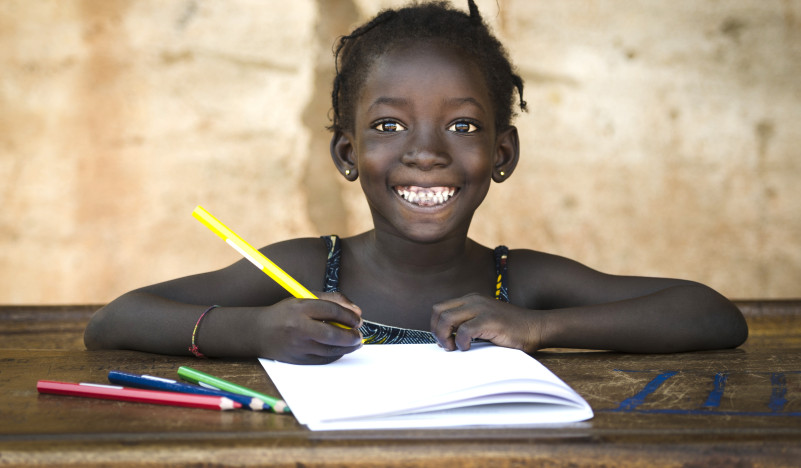
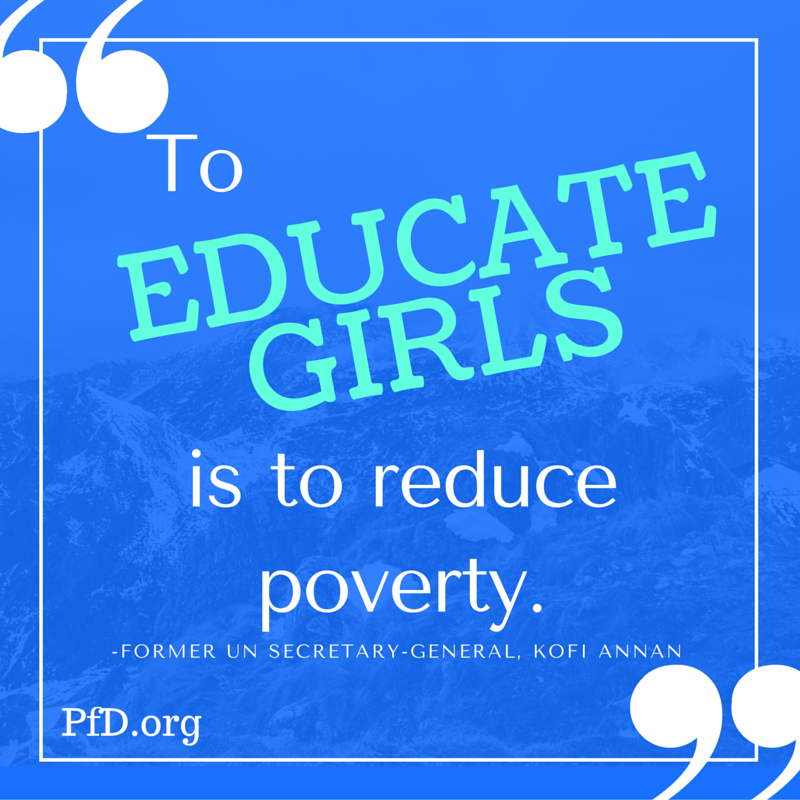
The current literacy rate for females in Nigeria is approximately 20% lower than it is for males1. Girls also spend an average of eight years in school throughout their lifetime in comparison to girls in the United States whom spend an average of 17 years. With secondary education in Nigeria costing around $500.00 annually, many young girls are unable to advance beyond elementary education without additional support. 70% of Nigerians1 also live below the poverty line and it may be quite difficult to use excess funds towards furthering their child’s education. With the help of your donation to the Scholarship Fund, PfD can significantly reduce the financial strain on families in order to continue to pay for education for their children.
Meet Lucy, one of the newest recipients of the Anne Johnson Memorial Scholarship Fund. Lucy is 12 years old, the second of three children and ranks at the top of her class. Lucy aspires to educate other young children one day by becoming a Mathematics lecturer after her studies. She is currently studying twelve subjects and loves learning at school, reading, and mathematics. All of Lucy’s textbooks for her numerous classes were provided by the Anne Johnson Memorial Scholarship Fund (AJMSF). Lucy’s dreams are much more of a reality with the help of AJMSF. Lucy’s mother, Mrs. Ifeoma, was so grateful to PfD for giving her daughter the opportunity to help further her education and promised to continue to encourage her daughter to do well in her studies and stay in school.
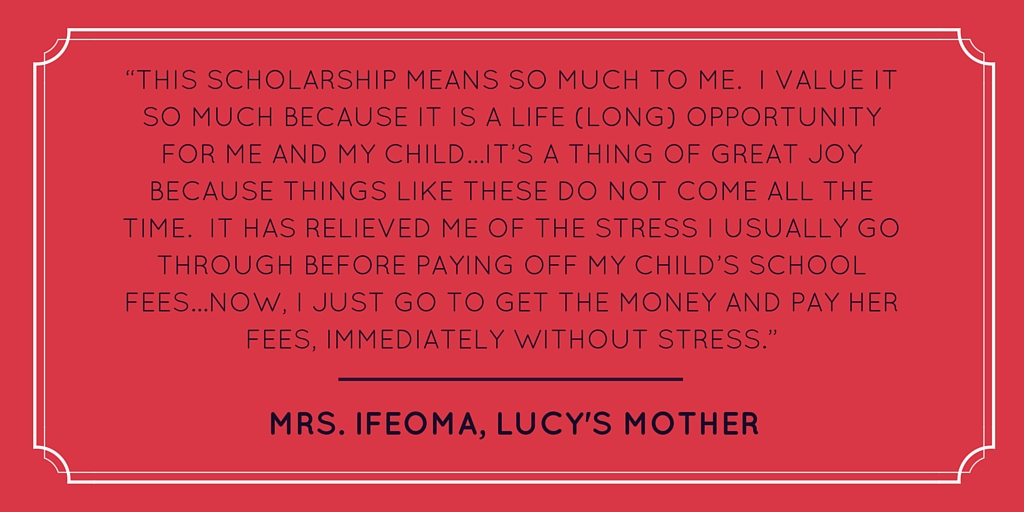
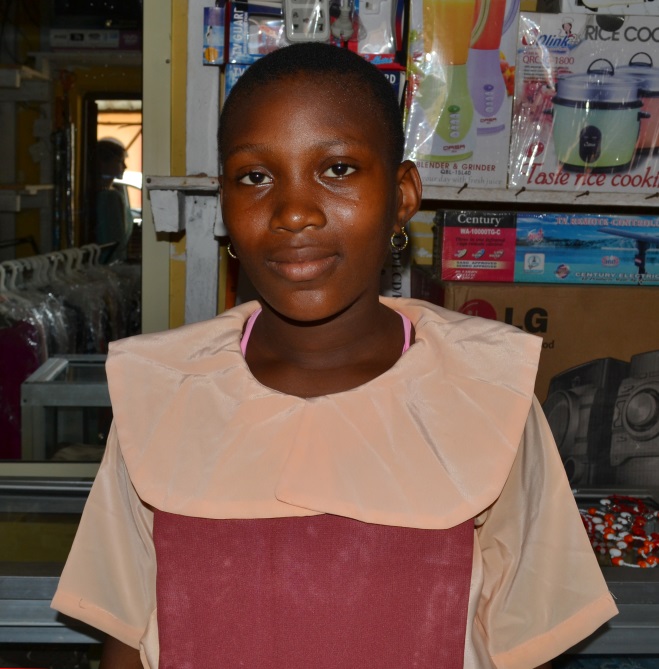 The Scholarship Fund that Lucy received was created in memorial of Anne Johnson, former PfD Country Program Director. Initially PfD, in partnership with Life Above Poverty Organization (LAPO), set a target of $20,000.00 annually to support the Scholarship endowment. However, in August 2015, less than one year after the AJMSF began, friends, family members and three institutions donated close to $30,000 in her memorial.
The Scholarship Fund that Lucy received was created in memorial of Anne Johnson, former PfD Country Program Director. Initially PfD, in partnership with Life Above Poverty Organization (LAPO), set a target of $20,000.00 annually to support the Scholarship endowment. However, in August 2015, less than one year after the AJMSF began, friends, family members and three institutions donated close to $30,000 in her memorial.
Since 2014, 26 Nigerian girls have been awarded scholarships from the AJSMF to support their secondary education. Each year, drawings are held to decide on the winners because there were so many girls who qualify for scholarships based on economic need. Staff members from LAPO and PfD meet with the winners a few times a year to track their successes in school since receiving the scholarship fund. Past AJMSF recipients have graduated from secondary school and will continue to receive support from PfD to further their education.
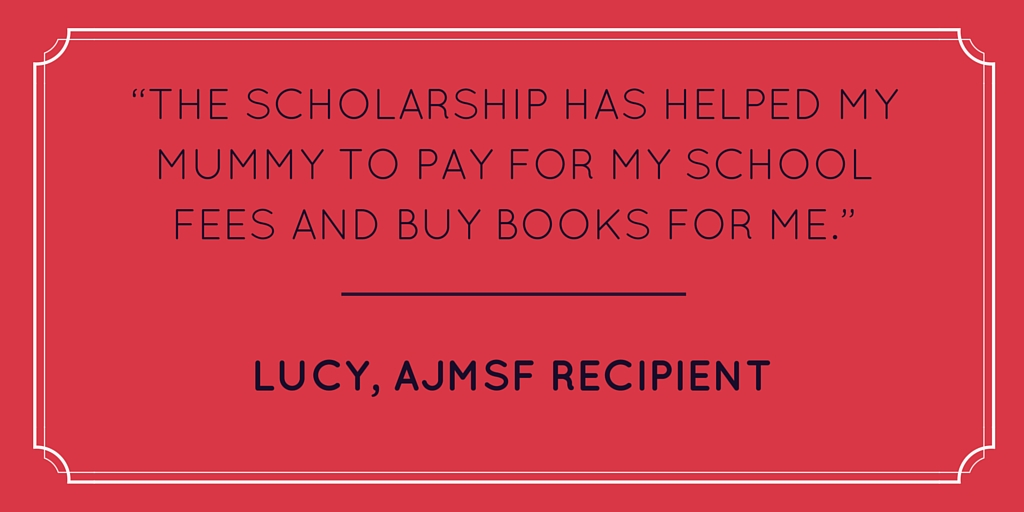 In the future, PfD and LAPO plan to give other young girls like Lucy the opportunity to help pay for secondary school and achieve their educational aspirations. To support more girls like Lucy donate $250 to the Scholarship Fund today.
In the future, PfD and LAPO plan to give other young girls like Lucy the opportunity to help pay for secondary school and achieve their educational aspirations. To support more girls like Lucy donate $250 to the Scholarship Fund today.

World Environment Day (WED) has been an annual call to action since 1974. WED is a widely celebrated event that allows individuals in over 100 countries to bring public awareness to the biggest issues affecting our environment. In just the past five years, this day has highlighted numerous urgent issues ranging from a greener global economy, raising awareness for climate change, reducing the growth rate and preserving the planet’s resources. Above all though, WED serves as the “people’s day” so we as individuals can be a representative of change and inspire our global community to take better care of our Earth.
Our name, “Partners for Development (PfD)” summarizes our approach of working with various groups of people to achieve sustainable change. We deliver those sustainable solutions by focusing on three key areas: healthy communities, economic empowerment, and agricultural development. PfD’s project in Benin is a great example of how our organization is not only raising awareness, but also bringing about change to improve our global environment. PfD is training local farmers to increase harvests through better growing techniques. Those strategies that coincide with WED’s vision of creating a more sustainable environment included decreasing harvest spoilage, appropriating the use of pesticides and improving water and soil resources. Through our work in Benin, PfD has accomplished the following:
● 60% of farmers participating now use pesticides in a safer and more effective manner by utilizing strategies such as proper dosage and eliminating unnecessary environmental health hazards.
● 21 solar dryers were used during cooking demonstrations with farmer groups to enable them to continue with eco-friendly post-harvest vegetable processing activities.
● We successfully tested two solar irrigation pumps that are able to reduce irrigation cost and pollution in Northern and Southern Benin.
PfD is celebrating this World Environment Day by continuing to make a difference in the world by improving the quality of life and collectively changing behaviors to support sustainable lifestyles. PfD envisions a more just, peaceful, and environmentally sustainable world and partners with local organizations to bring upon lasting change.

Would you like to make an impact on World Environment Day? Show your support by sharing on social media and tagging @Partners4dev on Twitter or following us on Facebook.
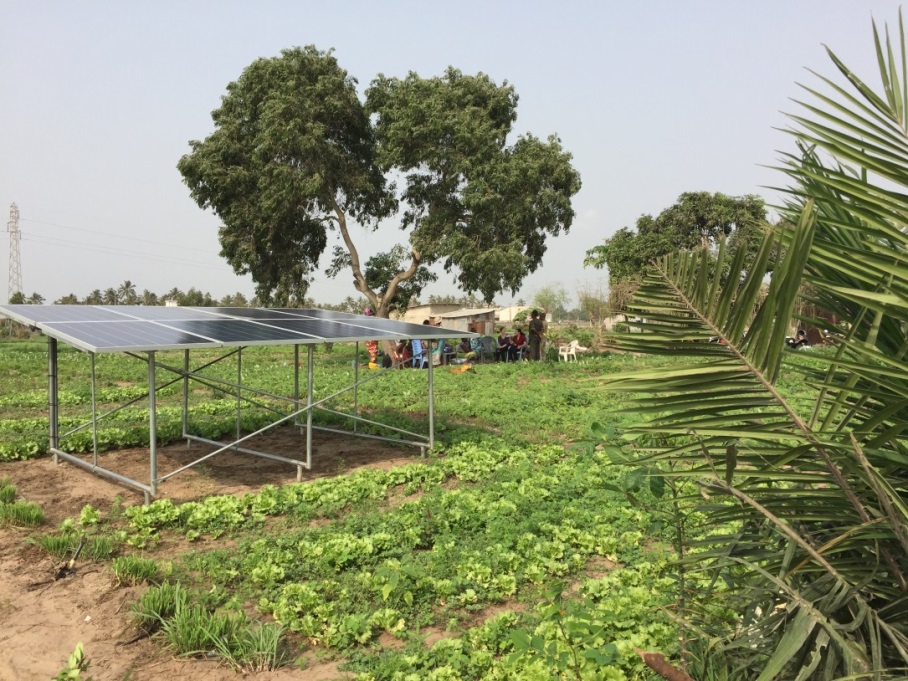
Agriculture accounts for 70% of Benin’s employment and 35% of its GDP, making agricultural production an area of critical development. Improving current irrigation methods can significantly increase production and processing for local farmers by enabling them to produce even during the two dry seasons, because it gives farmers the ability to artificially provide water for their land without relying on rainfall. The common irrigation methods used by farmers in Benin, especially during the two dry seasons (from November to February and during August and September), totaling six months, are gas-powered pumps and manual watering by hand. A manual irrigation system requires a large amount of labor and often results in crop wastage from improper watering. Gas powered irrigation pumps are very expensive to operate and emit a substantial amount of pollution into the air and soil. PfD hypothesized that farmers in Benin would greatly benefit from cost effective, solar based irrigation technologies that are environmentally friendly, both for the farmer and the soil.
For the GREEN Project in Benin, PfD tested solar-powered irrigation pumps to determine if they could be a cost-effective approach and nonpolluting method to improving vegetable production. Solar panels are installed in each solar irrigation pump to power the surface pump’s internal electric motor. Once the motor is running, water is pumped from the pond directly onto the fields through hoses or sprinklers, or pumped into storage tanks to be used for later. The advantages of a water solar irrigation pump include:
- No fuel cost
- Non-polluting
- Low maintenance cost
- Produces water when vegetables need it most
- Highly reliable and durable
- Easy to operate
- Easy water storage
For the GREEN Project in Benin, PfD tested solar-powered irrigation pumps to determine if they could be a cost-effective approach and nonpolluting method to improving vegetable production. The two types of solar-powered irrigation pumps tested for the pilot were GRUNDFOS and LORENTZ PS 150. Both models have been used to power irrigation systems in northern states of Benin, but neither had ever been tried in the southern region of the country, where PfD operates. PfD brought 450 farmers to six different test sites throughout the southern regions to participate in the pilot.
Results from the test exhibited that both the GRUNDFOS pump and the LORENTZ PS 150 pump can be used effectively in southern Benin and would substantially reduce irrigation cost and pollution. Both pumps are also guaranteed for 25 years, which could potentially save farmers $63,000 or more during that time period. The German Cooperative Development Agency has also agreed to provide a reduction of up to 40% of the initial installation cost to convert to solar-powered agricultural equipment for all Beninese farmers for the next five years. Several GREEN farmers expressed interest in buying the solar system and in taking advantage of the reduced price.

Shortly after attending the test pilot, farmers installed a solar irrigation system in the Semi-Podji district. The group, which used a gas-powered pump before, notes that the new solar irrigation system covers around 2.5 acres of land and has saved them over $200 per month, which is a considerable amount of money for the group. Through the GREEN Project, PfD was able to effectively show how using innovative technologies like the solar-powered irrigation pump can be used to achieve sustainable development in communities. We hope that many other farmers will transition to a solar-powered irrigation pump system to achieve the same results.
Partners for Development is always seeking support from individuals and organizations in order to improve the quality of life in developing countries. Become a Partner for Development Today! With your contribution, other innovative technologies and key activities can be implemented to make a difference in the lives of those that need it most. To make a gift please click here!
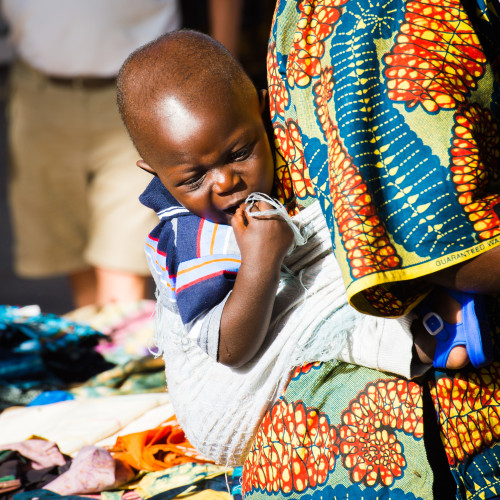
The Question of Quality: Comprehensive, Respectful, and Rights-Based Maternal Health
Imagine that you’re a young, pregnant woman. Imagine that you have to walk five miles to even get to the doctor. You arrive at the clinic, only to sit in a small, hot, overcrowded waiting room for four or more hours. When you finally do get to see a nurse, she mocks your accent, or your clothes. She scolds you for not coming in sooner, and makes you feel ashamed. Your understanding was that it was a free exam, but then you are asked to go to the pharmacy to buy gloves for the nurse. The nurse pricks your finger and says she’s testing you for a disease. You think you’ve heard of this disease, and you heard it kills people. You’re scared of it, but she doesn’t say more – doesn’t say if she thinks you might have it or if it will hurt your baby. You’re given a confusing mix of pills that are bitter tasting, and told that the clinic is out of some. The nurse says you should come back next week to get these, and that you should come back for another exam in 2 months.
Would you return to the health facility?
For many women in the developing world, this example closely resembles their experience. Each year, over 300,000 women die in pregnancy and childbirth, 99 percent of them in the developing world. For every woman who dies of pregnancy-related complications, 20 to 30 more suffer from related on-going conditions which may permanently affect their normal functioning –additional 6 to 9 million women per year. Maternal health advocates, researchers, and providers are committed to ending human rights abuses and promoting skilled and dignified care. Together, we can make comprehensive, respectful, and rights-based maternal health care available to all.
Maternal mortality and morbidity are the tragic result of a myriad of compounding factors. 75% of maternal deaths are caused by severe bleeding, infections, high blood pressure during pregnancy, complications from delivery, and unsafe abortion. Other deaths are often caused by or associated with other diseases such as malaria or AIDS. Delivering at a medical facility with a skilled health care worker present is critical should these complications arise, but often they can be avoided altogether if a woman attends antenatal care visits. However, only 40% of women in low-income countries complete the recommended number of antenatal care visits.
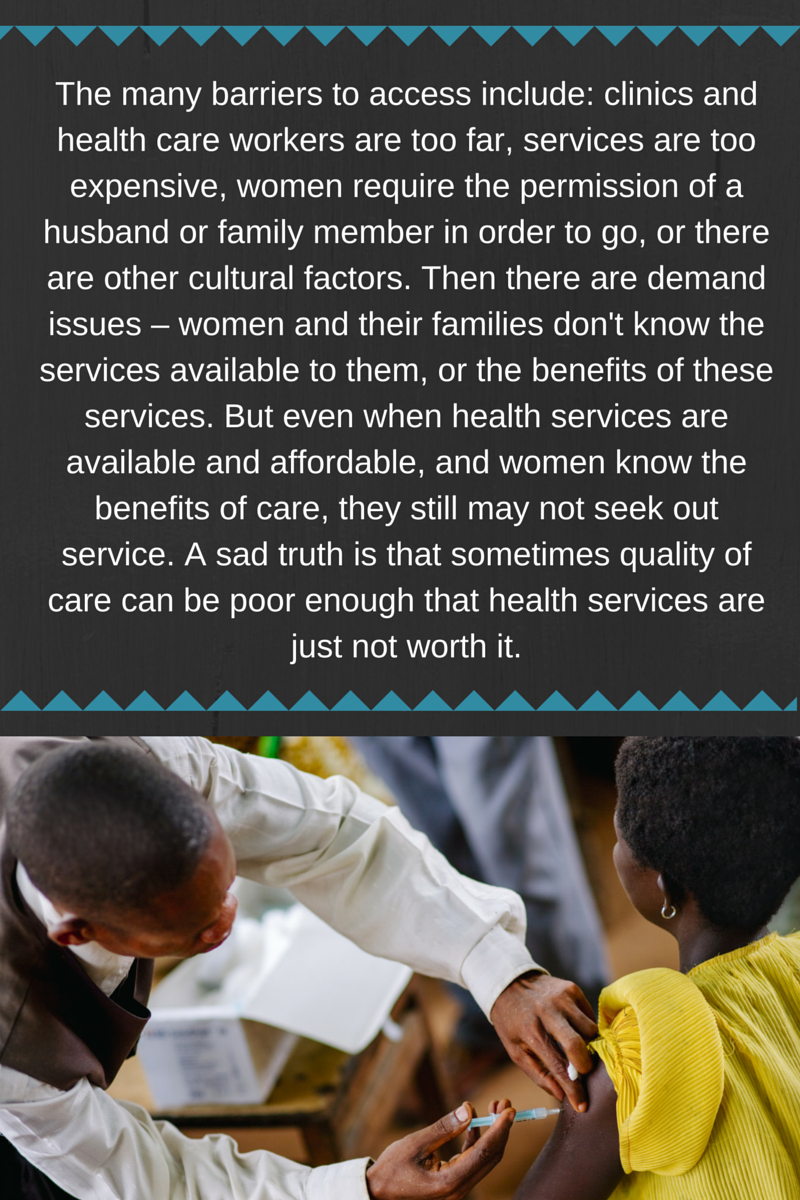
As the example above illustrates, accessing care for some women can not only be difficult, it can be intimidating, humiliating, and scary. Unsurprisingly, receiving poor care makes women less likely seek health care out in the future. This is why it’s crucial to not only provide access (by making healthcare close and affordable), to educate women, their families, and their communities about the importance of maternal health care, but also to work with health clinics and health workers to ensure quality of care – the respectful, comprehensive, and competent care that every human deserves.
At PfD, we deliver integrated programs that address the nuanced reality on the ground. In Nigeria, we not only provide education to women, their families, and communities and engage with key community leaders to change behavior. We also work with health care providers to ensure that they have the knowledge and resources to provide quality care. PfD worked to deliver improved maternal, newborn, and child health services through the training and mentoring of health care personnel, including nurses and midwives, community health extension workers, and community based healthcare volunteers. PfD trained nurses and midwives on quality of care and trained health care workers on Balanced Counseling Strategy which improves client-provider interactions and client satisfaction. The results of this project speak for themselves – In the first year of the project, 15,562 women attended at least one session of antenatal care during pregnancy – by the end of the project over 44,000 did. This represents an increase of over 280%.
Through the Scale-up of Prevention of Mother-to-Child Transmission and Pediatric HIV/AIDS services in Delta State, Nigeria, PfD built the capacity of health facilities, training health workers to provide quality HIV testing and counseling, integrating Prevention of Mother-to-Child Transmission and HIV care into antenatal care services, and upgrading and equipping a laboratory to service as a comprehensive treatment hub. PfD trained health care workers and pregnant women received HIV testing and counseling. PfD also facilitated testing of pregnant women for HIV.
PfD is committed to the idea that no woman should be in danger because she gives birth, which is why we’re joining the global community in calling on the UN Secretary General to recognize April 11th as the International Day for Maternal Health and Rights. Together with the UN community we can make comprehensive, respectful, and rights-based maternal health care available to all. To sign the petition,click here. Follow the discussion at #IntlMHDay and through PfD’s social media updates. To learn more about our work to promote maternal health and healthy communities, click here.
April 6th, 2016, by Katie Baczewski, PfD Program Officer
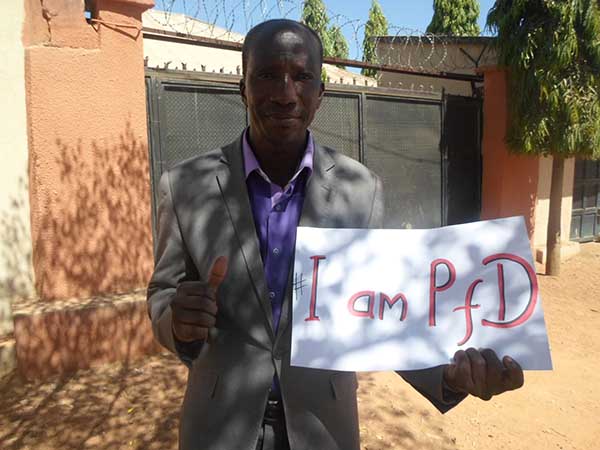
 PfD gives the greatest importance to the role of partners in every aspect of our work. We are deeply committed to involving local counterparts in assessing needs, designing programs, implementing activities and learning from the communities we jointly serve. PfD’s partner-oriented approach directs us to work with and harness the resources of the international community to meet the needs of vulnerable populations. Therefore, during our December campaign we wanted to feature one of our partners. Below is a Q&A with Pastor Ayuba Musa from Gerawa Women Multi-purpose Cooperative Society from Bauchi state, Nigeria.
PfD gives the greatest importance to the role of partners in every aspect of our work. We are deeply committed to involving local counterparts in assessing needs, designing programs, implementing activities and learning from the communities we jointly serve. PfD’s partner-oriented approach directs us to work with and harness the resources of the international community to meet the needs of vulnerable populations. Therefore, during our December campaign we wanted to feature one of our partners. Below is a Q&A with Pastor Ayuba Musa from Gerawa Women Multi-purpose Cooperative Society from Bauchi state, Nigeria.
Q: How did you first learn about PfD?
A: Gerawa Women Multi-purpose Cooperative Society is a community based rural micro-finance organization, base in Bauchi, Bauchi State of Nigeria. The organization got to know about Partners for Development in 2004. Prior to this time, Gerawa has been engaging in micro-credit program in the State at an elementary or infant stage. The institutional capacity of the organization to operate effectively and efficiently and the knowledge on micro-credit standard best practice was low. The capacity of the organization to access loan to finance its clients was low, with low portfolio strength of USD $15,000, out of which 80% of the loans were in arrears. It was at this stage that the organization team up with PfD.
Q: What led you to work with PfD?
A: Gerawa was so fascinated with PfD’s programs in Bauchi state which cut across (a) rural infrastructure development (b) small enterprise development i.e. micro-credit (c) health i.e. Reproductive health (d) and institutional capacity development/building. Taking the capacity challenge of the organization into consideration, Gerawa requested support with the micro-credit program in order to meet the need of our clients and reduce poverty level among the rural and vulnerable household women in the State.
Q: Tell us about the growth of your organization?
A: After over 10 years of good partnership with PfD, Gerawa has grown from lending USD $12,000 to $112,000 per year. Apart from micro-financing, the organization has equally benefited from the following PfD project activities:
Reproductive health training and support
- Integrated health and microfinance programming
- Expanded access to services for agricultural enterprise
- Business development skill training
- Nigeria Agricultural Enterprise Curriculum (NAEC) training and support
All these projects targeted rural women to improve their skills, increase sales and improved income. The uniqueness of implementing PfD project in the communities is integration approach to project delivery, which allows beneficiaries to access and enjoy more than one intervention at a time – holistic development.
Q: How has this partnership impacted your work?
A: The impact of the project implemented with PfD over years resulted in:
Improved Micro-finance: To date, we have issued over 3,200 microcredit loans mainly to women – 95% of borrowers are women.
Institutional capacity development of the organization: At the start of the project with PfD, an operational grant of over a million naira was received from PfD to complement staff salary and other administrative overheads. Likewise, trainings, seminars and workshops were organized by PfD to build the capacity of the implementing staff of the organization in project delivery and methodology so that we could sustain the work after the completion of the grant.
Supporting women farmers: We were able to strengthen the capacity of more than 2,000 small agricultural business holders, who were mainly women, to effectively plan, save, record, forecast, and negotiate properly for their products.
Successful program integration of health and microfinance: A total of 48 communities were reached and 2,747 women borrowers received health training and information, 11,420 immunization were given, 980 women of reproductive age received family planning commodities, 3,620 attended anti-natal care and 122 received various counseling on RH related issues.
Q: Any closing thoughts?
A: In conclusion, PfD has done great things in transforming the lives of ordinary people for the better, but there is still more to be done, thousands and millions of unreached ones are still plaguing in abject poverty and dying daily. PfD still needs more support to be able to continue doing the good work and be able to reach the less privileged.
Throughout all of December we will be sharing stories from our staff, board, partners, and others from around the globe. We can’t wait to share all of the hopeful, engaging, and positive stories from our work. We will be using the hashtag #IamPfD on Facebook, Twitter and LinkedIn.

Be sure to share the posts that you find engaging and inspiring with friends and family and don’t forget to donate and take an #unselfie of you making a donation and share it with us and use the #IamPfD for a chance to win prizes from PfD.

